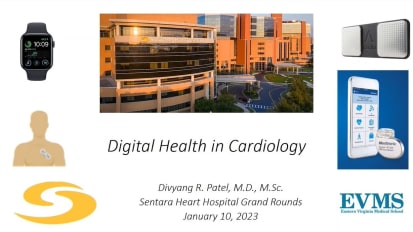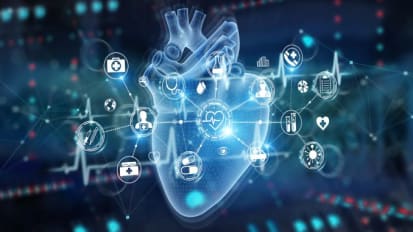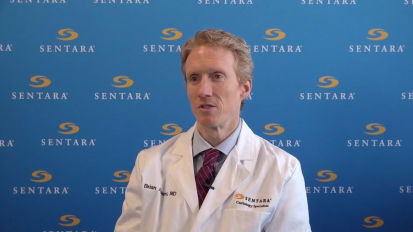Search Videos and More
 Video
Video
Provider Profile - James R. Daniels, Jr., M.D.
Meet General Surgeon, Dr. James R. Daniels, Jr., as he discusses his areas of focus, his path to medicine, and how robotic-assisted surgery is evolving in his field. Video
Video
Advantages of Robotic Surgery
James R. Daniels, Jr., M.D., briefly discusses the advantage of robotic-assisted surgery to the patient and to the surgeon. Video
Video
Multimodality Imaging in Pulmonary Vascular Disease
Dr. Mukherjee describes the role of novel echocardiographic applications to detect subtle abnormalities and RV contractility and contractile reserve and classifications of pulmonary hypertension. Video
Video
Update on Pritikin Intensive Cardiac Rehab Program
Dr. Sattler reviews the evolution of cardiac rehab and an introduction to intensive cardiac rehab. Video
Video
Digital Health in Cardiology
Dr. Div Patel discusses diagnosis and treatment of arrhythmias and how digital tools can assist in future care. Video
Video
Heart Failure with Reduced Ejection Fraction: The Preeminent Role of Medical Management
Dr. Herre presents guideline directed medical therapy for heart failure patients with reduced ejection fraction. Video
Video
Demonstrating the Value of Imaging: Outcomes Research and Big Data in Cardiac Imaging
Dr. Strom discusses the value of imaging and how to use outcomes research with imaging data to better inform our clinical practice and clinical management. Video
Video
Endocarditis
Dr. Cook describes the clinical manifestations of endocarditis and how to treat medically and surgically for best outcomes. Video
Video
Left Bundle Area Pacing
Dr. Hedley discusses traditional pacing, the methods of physiologic pacing and concepts of left bundle area pacing. Video
Video
MRI-Guided Surgical Ablation for Brain Tumors
Watch as Wylie H. Zhu, M.D., presents a case where the patient presented with known brain metastasis and the tumor had returned. Video
Video
Provider Profile - Brian J. Adams, M.D.
Meet Interventional Cardiologist, Dr. Brian J. Adams, as he discusses his areas of focus, his path to medicine, and what brought him to Sentara. Video
Video
Stress Induced Cardiomyopathy
Takotsubo syndrome or broken heart syndrome, can occur when a person experiences sudden acute stress that can rapidly weaken the heart muscle and often mimic or cause cardiomyopathy. Dr. Brian J. Adams, discusses why this can occur in otherwise healthy people and the prognosis.